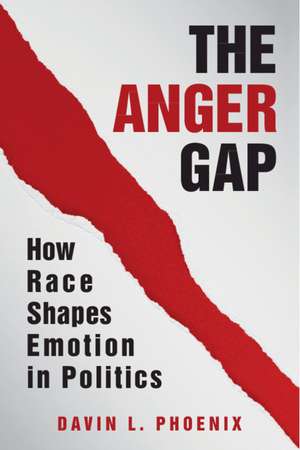The Anger Gap: How Race Shapes Emotion in Politics
Autor Davin L. Phoenixen Limba Engleză Paperback – 25 dec 2019
| Toate formatele și edițiile | Preț | Express |
|---|---|---|
| Paperback (1) | 160.82 lei 3-5 săpt. | |
| Cambridge University Press – 25 dec 2019 | 160.82 lei 3-5 săpt. | |
| Hardback (1) | 611.33 lei 6-8 săpt. | |
| Cambridge University Press – 25 dec 2019 | 611.33 lei 6-8 săpt. |
Preț: 160.82 lei
Nou
Puncte Express: 241
Preț estimativ în valută:
30.77€ • 33.53$ • 25.93£
30.77€ • 33.53$ • 25.93£
Carte disponibilă
Livrare economică 02-16 aprilie
Preluare comenzi: 021 569.72.76
Specificații
ISBN-13: 9781108725330
ISBN-10: 1108725333
Pagini: 300
Ilustrații: 66 b/w illus. 8 tables
Dimensiuni: 157 x 227 x 18 mm
Greutate: 0.41 kg
Editura: Cambridge University Press
Colecția Cambridge University Press
Locul publicării:New York, United States
ISBN-10: 1108725333
Pagini: 300
Ilustrații: 66 b/w illus. 8 tables
Dimensiuni: 157 x 227 x 18 mm
Greutate: 0.41 kg
Editura: Cambridge University Press
Colecția Cambridge University Press
Locul publicării:New York, United States
Cuprins
1. Anger in black and white; 2. Anger (mis)management?; 3. The anger gap and turnout in American politics; 4. From black anger to black activism; 5. The racial enthusiasm advantage in politics; 6. The anger gap, beyond black and white; 7. On dreams deferred and anger inhibited.
Recenzii
'The title of this book rightfully connotes the theme of anger, but it is about so much more! Davin Phoenix's thorough and nuanced analysis of the nexus of race, emotions, and political participation is a brilliant and timely contribution to the literature. Political scientists will be engaged by the discussion of political psychology, participation, and racial and ethnic politics; and Phoenix's findings make important interventions to interdisciplinary discussions about race, anger and pessimism. I highly recommend this engaging and thought-provoking work.' Andra Gillespie, Emory University
'The Anger Gap examines a novel question of whether racial and ethnic minorities are constrained from expressing anger about politics. Phoenix convincingly demonstrates that an anger gap between minorities and whites exists and the political cost is high. The book is original and should be of interest to students of American politics.' Antoine Banks, University of Maryland, College Park
'In this book, Davin Phoenix argues that African Americans and white Americans do not see the same types of events and policies as equally threatening and do not react in the same way. Black citizens are more likely to respond to political threats with resignation rather than anger and are subsequently less likely to participate in electoral politics than white Americans responding to the same threats. What is particularly powerful about Phoenix's argument is that it shows that a generalizable theory of emotion in politics needs to be contextualized by people's experiences with politics and the political environment.' Shana Gadarian, Syracuse University
'In this elegantly written book, Phoenix explains why African Americans are less likely than Whites to get angry over political matters - even though they arguably have more reasons to express anger. He shows, persuasively, that this anger gap has important implications for Black political participation and coalition building. I highly recommend this timely and important book.' Vincent Hutchings, University of Michigan
'This is a rare readable, data-driven study, one that all students of American political behavior should consume.' R. P. Seyb, Choice
'… Overall, Phoenix provides a compelling narrative about why Black Americans feel less angry and more resigned about the state of the political world.' Shana Kushner Gadarian , Journal of Race, Ethnicity, and Politics
'The Anger Gap will continue to illuminate the unique ways that these conditions shape the political terrain for an increasingly diverse group of voters and citizens.' Jenn M. Jackson, Ethnic and Racial Studies
'... this book special and enjoyable to read.' Bethany Albertson, American Politics
'The Anger Gap examines a novel question of whether racial and ethnic minorities are constrained from expressing anger about politics. Phoenix convincingly demonstrates that an anger gap between minorities and whites exists and the political cost is high. The book is original and should be of interest to students of American politics.' Antoine Banks, University of Maryland, College Park
'In this book, Davin Phoenix argues that African Americans and white Americans do not see the same types of events and policies as equally threatening and do not react in the same way. Black citizens are more likely to respond to political threats with resignation rather than anger and are subsequently less likely to participate in electoral politics than white Americans responding to the same threats. What is particularly powerful about Phoenix's argument is that it shows that a generalizable theory of emotion in politics needs to be contextualized by people's experiences with politics and the political environment.' Shana Gadarian, Syracuse University
'In this elegantly written book, Phoenix explains why African Americans are less likely than Whites to get angry over political matters - even though they arguably have more reasons to express anger. He shows, persuasively, that this anger gap has important implications for Black political participation and coalition building. I highly recommend this timely and important book.' Vincent Hutchings, University of Michigan
'This is a rare readable, data-driven study, one that all students of American political behavior should consume.' R. P. Seyb, Choice
'… Overall, Phoenix provides a compelling narrative about why Black Americans feel less angry and more resigned about the state of the political world.' Shana Kushner Gadarian , Journal of Race, Ethnicity, and Politics
'The Anger Gap will continue to illuminate the unique ways that these conditions shape the political terrain for an increasingly diverse group of voters and citizens.' Jenn M. Jackson, Ethnic and Racial Studies
'... this book special and enjoyable to read.' Bethany Albertson, American Politics
Notă biografică
Descriere
Anger can be a powerful political resource, but it mobilizes black and white Americans differentially to exacerbate political inequality.
